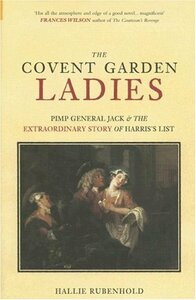You need to sign in or sign up before continuing.
Take a photo of a barcode or cover
198 reviews for:
The Covent Garden Ladies: Pimp General Jack & The Extraordinary Story of Harris' List
Hallie Rubenhold
198 reviews for:
The Covent Garden Ladies: Pimp General Jack & The Extraordinary Story of Harris' List
Hallie Rubenhold
challenging
dark
informative
reflective
medium-paced
Interesting and informative, but I would've liked to read more about the women on the list rather than the men who made the list.
Graphic: Sexual assault, Sexual content, Sexual violence
I really enjoyed The Five, which leant a lot of needed compassion to the women of the ripper case, as well as bringing to bear some strong historical analysis. This is, I think, an earlier piece of writing, and I found it much much harder to read, perhaps because of its focus on unremittingly horrible men, and the casual exploitation they undertook on a daily basis. This made me both angry and revolted in a way that also made me not want to read more about them. There’s also an odd number given at the start of the book which I think I misread (and I didn’t want to go back for it), but if true, meant they virtually the entire female population of london was involved in the sex trade (fairly sure therefore, they this was my error, not the author’s). But realising that I just didn’t want to find out more pushed me to also realise that the whole historical period was just grim, and still full of men who cheerfully think fame, importance and credit is due to them, despite their vile behaviour. So, not really the author’s fault, but I couldn’t make it past the person who was so unremittingly dirty that he was famed for stinking feet (I know this is an odd final straw, but there you are).
This book was incredibly interesting and incredibly difficult to read. This is a section of the 18th Century that is generally just skipped over and avoided for obvious reasons. Rubenhold presents the 18th Century sex trade's advantages and disadvantages for all those involved, repeatedly peeling back the flowery language and euphemisms of the contemporary era to force the reader to recognise the reality of her subject's everyday lives. This results in a complex depiction of how sex work measured against the rest of society as a way of life as well as the different ways in which those involved in it thought about themselves and each other.
Rubenhold uncomfortably undercuts the natural desire to conceptualise her subjects as those who 'deserved' to succeed due to their intelligence or luck or by being morally deserving by drawing the reader's attention to how their successes are created through their exploitation of those below them and their facilitation of harm to the vulnerable young women around them.
Rubenhold uncomfortably undercuts the natural desire to conceptualise her subjects as those who 'deserved' to succeed due to their intelligence or luck or by being morally deserving by drawing the reader's attention to how their successes are created through their exploitation of those below them and their facilitation of harm to the vulnerable young women around them.
challenging
dark
informative
inspiring
medium-paced
Note to self: please do not listen to this type of books as audiobook.
Fascinating portrait of the sex trade in 18th century London without the usual biased coming from the era and the time. Hallie Rubenhold is an engaging and precise narrator who masterfully mixes logic historical data to give the reader a sensible and intriguing narrative.
A little hard to follow at times, this book is still a very good example of how to write history for the general public.
Fascinating portrait of the sex trade in 18th century London without the usual biased coming from the era and the time. Hallie Rubenhold is an engaging and precise narrator who masterfully mixes logic historical data to give the reader a sensible and intriguing narrative.
A little hard to follow at times, this book is still a very good example of how to write history for the general public.
informative
sad
medium-paced
Slightly disappointed after reading The Five first. Some interesting parts, but felt this focused too much on the men involved in Harris’s List rather than the lives of the women which seemed like an afterthought crammed into the last chapter.
Hallie Rubenhold is one of my favourite discoveries of last year. While this didn't have the same emotional impact for me as 'The Five' did, I feel like I fell into a wonderful historical landscape that was historically accurate, interestingly written, and full of intimate details. I will continue to pick up her books!
this was undoubtedly interesting but I did it on audio and it definitely didn't keep my attention. nowhere near as good as The Five which is an absolute must-read.
funny
informative
lighthearted
medium-paced





